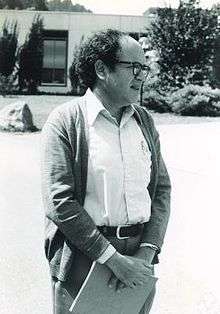Joseph J. Kohn
Joseph John Kohn (born May 18, 1932) is a Professor Emeritus of mathematics at Princeton University, where he researches partial differential operators and complex analysis.
Joseph J. Kohn | |
|---|---|
 | |
| Born | May 18, 1932 |
| Alma mater | MIT Princeton University |
| Scientific career | |
| Institutions | Princeton University |
| Doctoral advisor | Donald Spencer |
| Doctoral students | David Catlin Gerald Folland Pengfei Guan Mei-Chi Shaw |
Life and work
Kohn's father was Czech-Jewish architect Otto Kohn. After Nazi Germany invaded Czechoslovakia, he and his family emigrated to Ecuador in 1939. There Otto attended Colegio Americano de Quito.[1] In 1945, Joseph moved to the United States, where he attended Brooklyn Technical High School. He studied at MIT (S.B. 1953) and at Princeton University, where he obtained his PhD in 1956 under Donald Spencer ("A Non-Self-Adjoint Boundary Value Problem on Pseudo-Kähler Manifolds"). Later he was at the Institute for Advanced Study during 1957/58 (and again 1961/62, 1976/7, 1988/89).
From 1956/57, Kohn was an instructor at Princeton. In 1958, he served as Assistant Professor, in 1962 Associate Professor and in 1964 Professor at Brandeis University, where he also served as Chairman of the Mathematics Department (1963-1966). Since 1968, he has been a professor at Princeton University, where he served as chairman from 1993-96. He was a visiting professor at Harvard (1996/7), Prague, Florence, Mexico City (Centro de Estudios del IPN), Stanford, Berkeley, Scuola Normale Superiore (Pisa), Rome, Buenos Aires, and at IHES.
Kohn's work focuses, among other things, on the use of partial differential operators in the theory of functions of several complex variables and microlocal analysis. He has at least 65 doctoral descendants.
Kohn was a Sloan Fellow in 1963 and a Guggenheim Fellow on 1976/77. From 1976 to 1988, he was a member of the editorial board of the Annals of Mathematics. In 1966, he was an invited speaker at the International Congress of Mathematicians in Moscow ("Differential complexes").
Film director Miloš Forman was his half-brother through their father Otto Kohn.
Awards and honors
Since 1966, Kohn has been a member of the American Academy of Arts and Sciences and a member of the National Academy of Sciences since 1988. In 2012, he became a fellow of the American Mathematical Society.[2]
Kohn won the AMS Steele Prize in 1979 for his paper Harmonic integrals on strongly convex domains. In 1990, he received an Honorary Doctorate from the University of Bologna.[3] In 2004, he was awarded the Bolzano Prize.
Literature
- Bloom, Catlin, D´Angelo, Siu (Herausgeber) Modern methods in complex analysis. Papers from the conference honoring Robert Gunning and Joseph Kohn on the occasion of their 60th birthdays held at Princeton University 1992, Princeton University Press 1995
References
- Cook, portraits by Mariana (2009). Mathematicians an outer view of the inner world (Online-Ausg. ed.). Princeton, N.J.: Princeton University Press. p. 110. ISBN 1400832888.
- List of Fellows of the American Mathematical Society, retrieved 2013-01-27.
- Joseph J. Kohn at Princeton University (curriculum vitae)